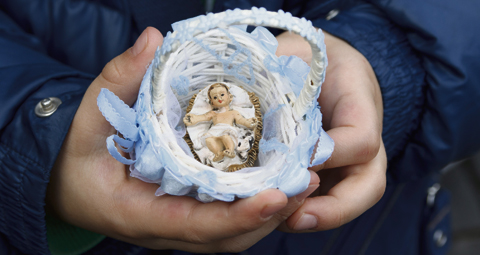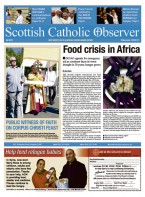May 11 | ![]() 0 COMMENTS
0 COMMENTS ![]() print
print

Intimacy, peace and God are found in the vulnerability of a child
— By Fr Ronald Rolheiser
There are different kinds of power and different kinds of authority. There is military power, muscle power, political power, economic power, moral power, charismatic power, and psychological power, among other things. There are different kinds of authority too: We can be bitterly forced into acquiescing to certain demands or we can be gently persuaded into accepting them. Power and authority are not all of a kind.
Imagine four people in a room: The first is a powerful dictator who rules a country. His word commands armies and his shifting moods intimidate subordinates. He wields a brutal power. Next to him sits a gifted athlete at the peak of his physical prowess, a man whose quickness and strength have few equals. His skills are a graceful power for which he is much admired and envied. The third person is a rock star whose music and charisma can electrify an audience and fill a room with a soulful energy. Her face is on billboards and she is a household name. That is still another kind of power. Finally, we have too in the room a newborn, a baby, lying in its crib, seemingly without any power or strength whatsoever, unable to even ask for what it needs. Which of these is ultimately the most powerful?
The irony is that the baby ultimately wields the greatest power. The athlete could crush it, the dictator could kill it, and the rock star could out-glow it in sheer dynamism, but the baby has a different kind of power. It can touch hearts in a way that a dictator, an athlete, or a rock star cannot. Its innocent, wordless presence, without physical strength, can transform a room and a heart in a way that guns, muscle, and charisma cannot. We watch our language and actions around a baby, less so around athletes and rock stars. The powerlessness of a baby touches us at a deeper moral place.
And this is the way we find and experience God’s power here on earth, sometimes to our great frustration, and this is the way that Jesus was deemed powerful during His lifetime. The entire Gospels make this clear, from beginning to end. Jesus was born as a baby, powerless, and He died hanging helplessly on a cross with bystanders mocking His powerlessness. Yet both His birth and His death manifest the kind of power upon which we can ultimately build our lives.
The Gospels describe Jesus’ power and authority in exactly this way. In Greek, the original language of the Gospels, we find three words for power or authority. We easily recognise the first two: energy and dynamic. There is a power in energy, in physical health and muscle, just as there is a power in being dynamic, in dynamite, in having the power to generate energy; but when the Gospels speak of Jesus as ‘having great power’ and as having a power beyond that of other religious figures, they do not use the words energetic or dynamic. They use a third word, exousia, which might be best rendered as vulnerability. Jesus’ real power was rooted in a certain vulnerability, like the powerlessness of a child.
This is not an easy concept to grasp since our idea of power is normally rooted in the opposite, namely, the notion that power lies in the ability to overwhelm, not underwhelm, others. And yet we understand this, at least somewhat, in our experience of babies, who can overpower us precisely by their powerlessness. Around a baby, as most every mother and father has learned, we not only watch our language and try not to have bitter arguments; we also try to be better, more loving persons. Metaphorically, a baby has the power to do an exorcism. It can cast out the demons of self-absorption and selfishness in us. That is why Jesus could cast out certain demons that others could not.
And that is how God’s power forever lies within our world and within our lives, asking for our patience. ‘Christ,’ as Annie Dillard says, ‘is always found in our lives just as He was originally found, a helpless baby in the straw who must be picked up and nurtured into maturity.’ But we are forever wanting something else, namely, a God who would come and clean up the world and satisfy our thirst for justice by showing some raw muscle power and banging some heads here and now. We are impatient with quiet, moral power that demands infinite patience and a long-term perspective. We want a hero, someone with the blazing guns of a Hollywood superhero but the heart of a Mother Theresa. The guns of the world blasting away evil, that is what we want from our God, not the power of a baby lying mute and helpless against the cruel powers of our time. Like the Israelites facing the Philistines, we are reluctant to send a shepherd boy against an ironclad giant. We want divine power in iron, muscles, guns, and charisma.
But that is not the way intimacy, peace, and God are found.
n Fr Ronald Rolheiser is a Catholic priest and member of the Missionary Oblates of Mary Immaculate. He is president of the Oblate School of Theology in San Antonio, Texas. Visit his website at www.ronrolheiser.com
Text











